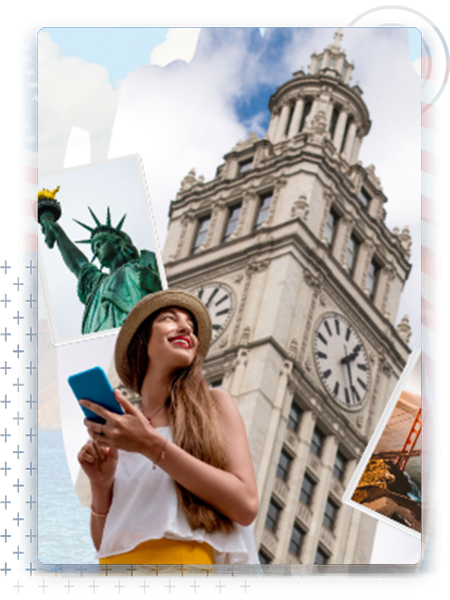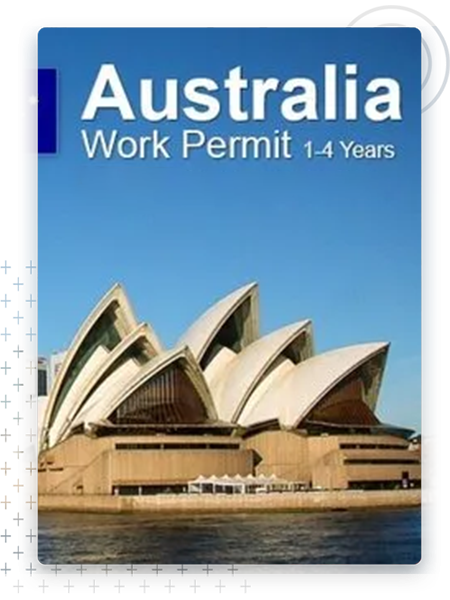
USA H-1B Visa
The H-1B visa is a non-immigrant visa that allows foreign nationals to work in the United States for a specific employer in a specialty occupation. It allows employers to petition for highly educated foreign professionals to work in “specialty occupations” that require at least a bachelor’s degree or the equivalent.
Here is some information about the H-1B visa:
- Eligibility: To qualify for an H-1B visa, you typically need to have a job offer from a U.S. employer for a position that requires specialized knowledge, and you must have the necessary educational qualifications and work experience to perform the job.
- Specialty Occupation: The job you are offered must be in a specialty occupation. This usually requires at least a bachelor’s degree or equivalent work experience in a field related to the job.
- Employer Sponsorship: An employer in the United States must sponsor your H-1B visa. You cannot apply for an H-1B visa independently.
- Quota: There is an annual cap on the number of H-1B visas issued, with a regular cap and an advanced degree exemption. As of my last update in September 2021, the regular cap was 65,000, and the advanced degree exemption was 20,000. However, it’s important to check with the U.S. Citizenship and Immigration Services (USCIS) for the most current numbers and updates, as these figures can change.
- Duration: H-1B visas are typically issued for an initial period of up to 3 years, with the possibility of extension for up to 3 more years, for a total of 6 years.
- Employer Requirements: Employers who sponsor H-1B visa holders are required to pay them a prevailing wage and provide the same working conditions and benefits as those offered to similarly employed U.S. workers.
- Change of Employers: H-1B visa holders can change employers, but the new employer must file a new H-1B petition on their behalf.
- Family Members: H-1B visa holders can bring their spouse and unmarried children under the age of 21 to the United States on H-4 visas. H-4 visa holders are allowed to attend school in the United States but are not allowed to work (with certain exceptions).
- Dual Intent: H-1B visa holders are allowed to have “dual intent,” which means they can pursue permanent residency (green card) while on an H-1B visa.
- Extension Beyond the 6-Year Limit: Under certain circumstances, it is possible to extend an H-1B visa beyond the 6-year limit, such as if the individual has an approved employment-based green card petition.
USA F-1 Visa
The F-1 visa is a non-immigrant student visa that allows foreign nationals to study in the United States at accredited academic institutions such as universities, colleges, and language schools. An F-1 visa is issued for up to 5 years. However, the residence status in the Unitd States is valid for the entire duration of the study and is noted on the I-20 form.
Here’s some important information about the F-1 visa:

- Eligibility: To qualify for an F-1 visa, you need to be accepted by a U.S. Student and Exchange Visitor Program (SEVP)-certified institution and demonstrate that you have the financial resources to cover your educational and living expenses while in the United States.
- Academic Program You must enroll in a full-time academic program, such as a degree program or an English language course at an accredited U.S. educational institution. F-1 visas are not typically granted for part-time or online programs.
- Duration: F-1 visas are typically issued for the duration of your academic program. If you are pursuing a degree, the visa can be valid for the length of your program, plus an optional period for practical training (Optional Practical Training or OPT).
- Employment: F-1 visa holders can work on-campus up to 20 hours per week during the academic year and full-time during school breaks. They can also apply for optional practical training (OPT) to gain work experience in their field of study after completing their program.
- Dependents: F-1 visa holders can bring their spouse and unmarried children under the age of 21 to the United States on F-2 visas. F-2 visa holders are not allowed to work but can attend school part-time.
- Maintaining Status: F-1 visa holders must maintain their student status by attending classes, making normal academic progress, and complying with U.S. immigration regulations. They must also report any changes in their program, address, or employment to their Designated School Official (DSO).
- Travel: F-1 visa holders can enter and exit the United States during their program but should carry the required documents, including a valid I-20 form and visa.
- Change of Schools: If you wish to change schools, you must inform your current school’s DSO and have your SEVIS record transferred to your new school.
- Post-Completion OPT: After completing your academic program, you can apply for OPT, which allows you to work in your field of study for up to 12 months. Some STEM (Science, Technology, Engineering, and Mathematics) graduates may be eligible for a 24-month STEM OPT extension.
- Taxes: F-1 visa holders must comply with U.S. tax laws. Depending on their income and circumstances, they may be required to file federal and state tax returns.

USA B-1 Visa
The B-1 visa is a non-immigrant visa that allows individuals to visit the United States for business purposes. It is a visitor visa for foreign nationals who want to travel to the United States for temporary business. This visa is typically issued for a period of 6-12 months and is used for supporting business activities such as attending conferences, conducting negotiations etc.
Here’s some important information about the B-1 visa:
- Eligibility: The B-1 visa is designed for individuals who wish to come to the United States for short-term business purposes, such as attending meetings, conferences, negotiating contracts, or participating in business-related training. It is not intended for individuals seeking to work or be employed in the United States.
- Duration: B-1 visa holders are typically granted entry for a short period, usually up to six months. However, the specific duration of stay is determined by the U.S. Customs and Border Protection (CBP) officer at the port of entry.
- Business Activities: Activities that are typically allowed on a B-1 visa include attending business meetings and conferences, negotiating business contracts, conducting market research, and engaging in short-term consulting or training. It’s important to note that gainful employment (i.e., receiving a salary or payment from a U.S. source) is not allowed on a B-1 visa.
- Dependents: The B-1 visa is for the primary business traveler. Spouses and children of B-1 visa holders are not eligible for dependent visas based on the B-1 status and may need to apply for different visa types, such as B-2 visitor visas.
- Applying for a B-1 Visa: To apply for a B-1 visa, you need to complete the DS-160 online visa application form, pay the application fee, and schedule an interview at the U.S. embassy or consulate in your home country. During the interview, you will be required to provide documentation supporting the purpose of your trip and your ties to your home country.
- Extension of Stay: If you need more time in the United States for business purposes, you may be able to apply for an extension of your B-1 status. Extensions are granted on a case-by-case basis
- Compliance: It’s essential to comply with the terms of your B-1 visa. Violating the conditions or engaging in unauthorized employment can lead to visa revocation, deportation, or future visa ineligibility.
- Tax Considerations: While on a B-1 visa, you are responsible for understanding and complying with U.S. tax laws, especially if you earn income or receive payments related to your business activities in the United States.
- Dual Intent: B-1 visa holders are expected to maintain a non-immigrant intent, meaning they should not intend to stay in the U.S. permanently. Demonstrating “dual intent,” or the intent to apply for an immigrant visa or adjust to a different non-immigrant status, may be challenging.
USA B-2 Visa
The B-2 visa is a non-immigrant visa that allows individuals to visit the United States for tourism, pleasure, or medical treatment. Its validity period ranges from 1 month to 10 years and allows single, double or multiples entries to the US. The period of stay which is a maximum of 6 months is recorded by the Customs and Border Protection officer.
Here’s some important information about the B-2 visa:

- Eligibility: The B-2 visa is intended for individuals who want to come to the United States for short-term purposes, including tourism, vacations, visiting friends or family, attending cultural or social events, or receiving medical treatment. It does not allow for employment or studying.
- Duration B-2 visa holders are typically granted entry for a short period, often up to six months. However, the specific duration of stay is determined by the U.S. Customs and Border Protection (CBP) officer at the port of entry.
- Tourism and Activities: Activities that are allowed on a B-2 visa include sightseeing, attending concerts or sporting events, participating in recreational activities, visiting family and friends, and seeking medical treatment. It is crucial to remember that while incidental tourist and business activities may be allowed (e.g., attending a conference or seminar), the primary purpose of the visit must be tourism or medical treatment.
- Dependents: Spouses and children of B-2 visa holders are not eligible for dependent visas based on the B-2 status. Each individual must apply for their own B-2 visa.
- Applying for a B-2 Visa: To apply for a B-2 visa, you need to complete the DS-160 online visa application form, pay the application fee, and schedule an interview at the U.S. embassy or consulate in your home country. During the interview, you will be required to provide documentation supporting the purpose of your trip, your ties to your home country, and your ability to financially support your stay in the United States.
- Extension of Stay: If you find that you need more time in the United States for valid reasons (e.g., medical treatment took longer than expected), you may be able to apply for an extension of your B-2 status. Extensions are granted on a case-by-case basis.
- Compliance: It’s important to comply with the terms of your B-2 visa. Overstaying the duration of your authorized stay, engaging in unauthorized employment, or violating the conditions of your visa can lead to visa revocation, deportation, or future visa ineligibility.
- Tax Considerations: While on a B-2 visa, you are responsible for understanding and complying with U.S. tax laws, especially if you earn income or receive payments related to your activities in the United States.
- Dual Intent: B-2 visa holders are expected to maintain a non-immigrant intent, meaning they should not intend to stay in the U.S. permanently. Demonstrating “dual intent,” or the intent to apply for an immigrant visa or adjust to a different non-immigrant status, may be challenging.

Europe and Schengen Visas and work Permits
Europe is a continent composed of many countries, each with its own immigration and visa policies. The specific visa requirements and application processes can vary widely from one European country to another. However, I can provide a general overview of the most common types of visas and the Schengen visa, which allows travel within the Schengen Area.
Here’s some important information about Europe and Scheengen Visas and work Permits:
- Schengen Visa: The Schengen Area is a group of 26 European countries that have abolished passport control at their mutual borders. If you plan to visit multiple Schengen countries, you can typically apply for a Schengen visa that allows you to travel freely within this area. Schengen visas are issued for short stays, such as tourism, business, or family visits, and they are valid for a maximum of 90 days within a 180-day period.
- National Visas: If your primary destination is a specific European country, and you plan to stay for an extended period, you may need to apply for a national visa for that country. National visas are typically required for purposes like work, study, family reunification, and long-term residence.
- Visa Requirements: Visa requirements vary by country and visa type. Common requirements include a valid passport, a completed visa application form, passport-sized photos, proof of travel insurance, proof of accommodation, proof of financial means to cover your stay, and, in some cases, a flight itinerary.
- Schengen Visa Application Process:
- Determine the Schengen country you plan to visit first or spend the most time in; this will be your main destination.
- Complete the Schengen visa application form, which is usually available on the website of the consulate or embassy of the main destination country.
- Schedule an appointment with the consulate or embassy to submit your application. Be prepared for an interview and biometric data collection (e.g., fingerprints).
- Pay the visa application fee.
- Provide the required supporting documents.
- Wait for the visa to be processed. The processing time can vary but is usually within 15 calendar days.
- Attend the appointment to collect the visa if approved.
- Long-Term Visas and Residence Permits: If you plan to work or study in Europe, you may need a long-term visa or residence permit. Requirements for these visas vary significantly, and they often involve additional documentation, such as proof of admission to an educational institution or a job offer from an employer.
Canada Work Permit
A work permit is a legal document that allows foreign nationals to work in Canada temporarily. There are various types of work permits, each with specific eligibility criteria.
Here is some information on Canada work permits:

- Temporary Work Permit: A temporary work permit allows you to work in Canada for a specific job and duration. The key points to know about temporary work permits include:
- Employer-Specific Work Permit:Most work permits are tied to a specific employer and job. Your employer in Canada must obtain a Labor Market Impact Assessment (LMIA) or offer you a job under an LMIA-exempt category.
- LMIA-Exempt Work Permits:Some categories, such as intra-company transfers, international agreements (e.g., NAFTA, CETA), and certain types of caregivers, do not require an LMIA.
- Open Work Permits:Open work permits allow you to work for any employer in Canada. They are typically available in specific circumstances, such as the spouse or common-law partner of a skilled worker, certain international graduates, or those under humanitarian and compassionate grounds.
- Duration:The duration of your work permit will depend on the job offer and the specific LMIA or LMIA-exempt category. It may be for a few months to several years.
- Applying for a Work Permit:
- To apply for a work permit, you generally need to complete the appropriate application form and provide supporting documents.
- You may need to provide a valid job offer from a Canadian employer.
- Some applicants may need to undergo a medical examination, police clearance, or biometrics.
- If required, you must also obtain a temporary resident visa or an Electronic Travel Authorization (eTA) to enter Canada.
- Spouses and Dependents: In many cases, spouses and dependent children of foreign workers may be eligible for open work permits or study permits to accompany the primary work permit holder.
- Extensions and Renewals: If you wish to extend your stay in Canada or continue working, you’ll need to apply for a work permit extension before your current permit expires.
- Post-Graduation Work Permit: If you have graduated from a designated Canadian educational institution, you may be eligible for a post-graduation work permit, which allows you to gain Canadian work experience.
- Work Permits and Permanent Residency: Some work permits can be a stepping stone to permanent residency in Canada. Gaining Canadian work experience can improve your eligibility for Express Entry programs and other immigration pathways.
- Labour Market Impact Assessment (LMIA): For most employer-specific work permits, your Canadian employer will need to obtain a positive LMIA, which shows that there is a genuine need for a foreign worker and that no Canadian worker is available to fill the position.

UK Work Permit
The United Kingdom has various categories of work permits and visas for foreign nationals who wish to work in the country. The specific visa or permit you’ll need depends on your employment situation, qualifications, and individual circumstances.
Here is some information on UK work permits:
- Skilled Worker Visa (formerly Tier 2 General): This is one of the most common work visas for skilled workers, and it is part of the UK’s points-based immigration system. Key details include:
- Eligibility:To apply for a Skilled Worker Visa, you typically need a job offer from a UK employer with a valid Sponsorship Certificate. The job must meet the required skill and salary thresholds, and you must score enough points on the points-based system.
- Sponsorship:Your prospective employer in the UK must be a licensed sponsor, and they will need to issue you a Certificate of Sponsorship (COS) to apply for the visa.
- Duration:Skilled Worker Visas can be issued for up to 5 years initially, with the possibility of extension.
- Switching Jobs:You can switch employers while holding a Skilled Worker Visa, but the new employer must be a licensed sponsor and issue you a new COS.
- Intra-Company Transfer Visa (ICT): This visa allows multinational companies to transfer their employees to a UK branch or subsidiary. The ICT category includes Short-Term Staff, Long-Term Staff, and Graduate Trainee routes.
- Global Talent Visa: This visa is for individuals who are recognized as leaders or emerging leaders in their respective fields, including science, humanities, engineering, the arts, and digital technology.
- Entrepreneur Visa: This visa is for individuals who want to start a business in the UK. It is part of the Innovator visa category.
- Youth Mobility Scheme: This scheme is available to young people (aged 18 to 30) from certain countries and territories, allowing them to live and work in the UK for up to 2 years.
- Ancestry Visa: If you have a grandparent who was born in the UK, you may be eligible for this visa, which allows you to work and live in the UK for up to 5 years.
- Seasonal Worker Visa: This visa allows foreign nationals to work in the UK for a short period, typically in seasonal agricultural roles.
- Tier 5 Visas: The Tier 5 category includes several visas for specific purposes, such as temporary religious workers, charity workers, creative and sporting workers, and more.
- Work Visas and Brexit: The United Kingdom has left the European Union, and this has implications for citizens of EU/EEA countries who want to work in the UK. New rules and requirements apply, and EU/EEA citizens typically need to apply for the relevant work visa.
Australia Work Permit
Australia offers a variety of work permits and visas for foreign nationals who wish to work in the country. The specific visa or permit you’ll need depends on your employment situation, qualifications, and individual circumstances.
Here is some information on Australia work permits:

- Temporary Skill Shortage (TSS) Visa (Subclass 482): The TSS visa allows skilled workers to come to Australia and work for an approved business for up to four years. Key details include:
- Eligibility:To be eligible, you need to have a job offer from an approved sponsor and meet the relevant skills and qualifications requirements. Your occupation must be on the relevant skilled occupation list.
- Sponsorship:Your prospective employer in Australia must be an approved sponsor and nominate you for the position.
- Duration:The duration of the TSS visa depends on the type of occupation and the specific stream (Short-Term or Medium-Term).
- Employer Nomination Scheme (ENS) Visa (Subclass 186): The ENS visa allows skilled workers to work in Australia on a permanent basis after being nominated by an approved Australian employer.
- Regional Sponsored Migration Scheme (RSMS) Visa (Subclass 187): The RSMS visa is for skilled workers who want to work in regional Australia. It’s a permanent visa that requires sponsorship from an approved regional employer.
- Skilled Independent Visa (Subclass 189) and Skilled Nominated Visa (Subclass 190): These are points-based visas for skilled workers who have the qualifications and skills needed in Australia. They don’t require employer sponsorship.
- Working Holiday Visa (Subclass 417) and Work and Holiday Visa (Subclass 462): These visas are for young people aged 18 to 30 (or 35 in some cases) who want to work and travel in Australia. They are typically valid for up to one year and allow you to work with some limitations.
- Temporary Graduate Visa (Subclass 485): This visa is for international students who have recently graduated from an Australian educational institution. It allows you to stay in Australia to gain work experience.
- Temporary Work (Short Stay Specialist) Visa (Subclass 400): This visa is for people who want to come to Australia for short-term, highly specialized, non-ongoing work.
- Business Innovation and Investment Visa (Subclass 188/888): These visas are for business owners and investors who wish to establish or manage a business or make a significant investment in Australia.
- Partner Visas: If you are in a genuine and ongoing relationship with an Australian citizen or permanent resident, you may be eligible for a partner visa that allows you to live and work in Australia.
- SkillSelect: Many skilled worker and business visas are subject to the SkillSelect system, which is a points-based system that helps the Australian government manage its skilled migration program. Applicants are invited to apply based on their points score and occupation.

Study Visa Services
Embarking on an international education journey is a dream for many students around the world. Pursuing higher education in countries like the USA, Canada, the United Kingdom, Europe, New Zealand, Australia, and more opens up a world of opportunities for academic excellence and personal growth. At [Your Immigration Agency], we are here to assist you in making this dream a reality by providing comprehensive student visa services tailored to your needs.
Our dedicated team of experienced immigration professionals is well-versed in the intricacies of student visa applications. We understand the unique requirements of each destination country and are committed to guiding you through the entire application process, ensuring your success. Here’s why you should choose us:
- Expert Guidance:Our team comprises experts in international education and immigration, ready to provide guidance on the most suitable educational institutions, courses, and visa options for your career aspirations.
- Tailored Solutions: We believe that one size does not fit all. Your education and career goals are unique, and so is your visa application. We work closely with you to create a personalized plan that addresses your specific needs.
- Comprehensive Services: From helping you select the right program and institution to preparing and submitting your visa application, we offer end-to-end assistance. Our services include documentation support, visa application submission, and interview preparation.
- Global Reach We specialize in student visa services for various countries, including the USA, Canada, the UK, Europe, New Zealand, Australia, and more. We have a vast network of partner institutions and government contacts to ensure you receive the best support at every step.Our Destination Countries
- USA: Fulfill your academic aspirations in the land of innovation and opportunity. Our student visa services for the USA will help you navigate the complex application process and secure your study visa.
- Canada: Experience world-class education in a diverse and welcoming environment. Our team can guide you through the Canadian student visa application process.
- United Kingdom: With its prestigious institutions and cultural richness, the UK is a preferred destination for students. We’ll assist you in obtaining your UK student visa.
- Europe: Whether you have your sights set on Germany, France, the Netherlands, or any other European country, we can help you find the right program and secure your student visa.
- New Zealand: Discover the beauty of New Zealand while pursuing your education. We can provide support throughout your New Zealand student visa application.
- Australia: A nation known for its high-quality education and lifestyle, Australia is a popular choice among international students. Let us assist you in obtaining your Australian student visa.
